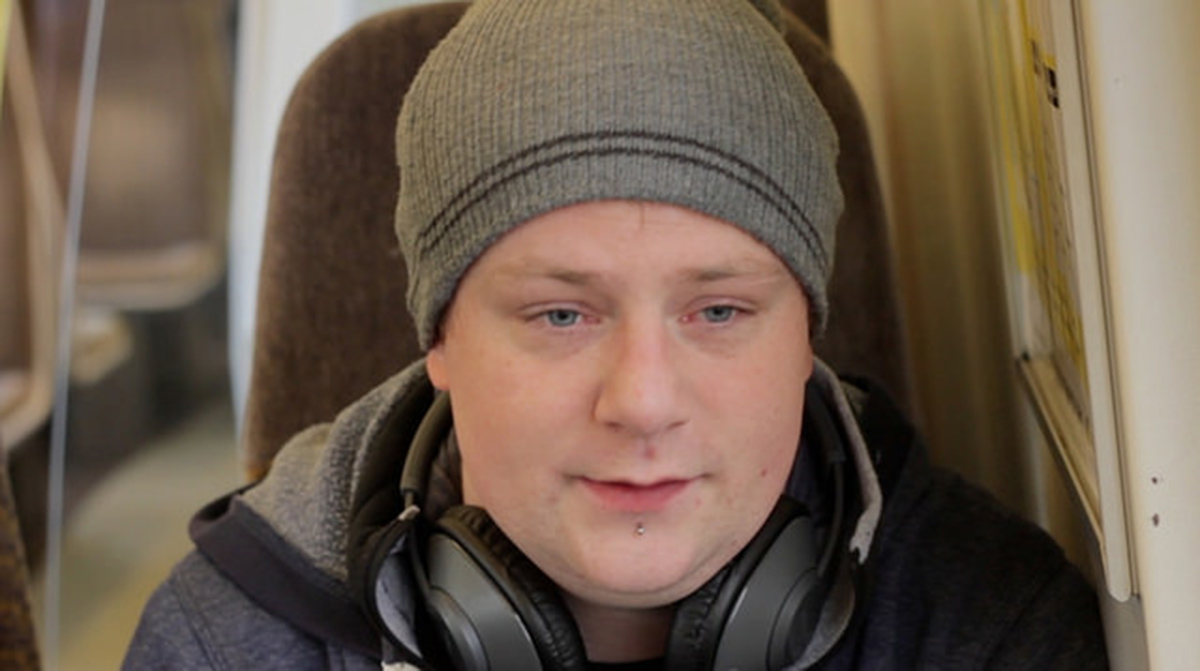A neurological condition that causes involuntary physical and vocal tics, Tourette's Syndrome is best known by its ability to cause random swearing. What do you need to know about Tourette's Syndrome beyond the profanities?
"I have tics," Anne-Leigh, a girl I went to high school with, announced in front of the whole class on the first day of school. Tics, she explained, meant that her face would often twitch in a certain way, she'd make clicking and grunting noises with her mouth, and sometimes her arm would violently swing her arm or say embarrassing things without meaning to. Tics were uncontrollable, like when you try to stop a sneeze — no matter how hard you fight against that sneeze, your body will eventually make it burst forth, and you have little to do with that.
Most of the time, Anne-Leigh's tics were barely noticeable. I do recall her loudly yelling "tampons, tampons — MENSTRUATION!" during a math test once, but all the rest of us quickly grew used to the facial twitches and small noises, and thought she was kind of cool for being able to get away with swearing in class.
Anne-Leigh had Tourette's Syndrome. Though first discovered in 1885 by French neurologist Georges Gilles de la Tourette, none of us kids had heard about her neurological disorder before she came along. That has changed today — almost everyone is familiar with the name Tourette's Syndrome, and most people associate it with the involuntary swearing that affects about 10 percent of sufferers. Tourette's is much more than involuntary swearing, however, and to those who have it, Tourette's can be everything but funny.
Greg, a Tourette's sufferer featured in the 2009 BBC documentary about Tourette's I swear I can't help it, for instance, would collapse onto the floor as a child, unable to do anything but move his eyes. He'd also scream in class, severely disrupting himself and everyone around him.
What Do We Know About Tourette's?
Tourette's Syndrome is a neurological disorder that comes in mild and severe forms. The most severe form, also sometimes called full-blown Tourette's, currently affects up to 200,000 Americans, with the milder form placing a mark upon the lives of thousands more. Though the disorder most frequently shows up in childhood between the ages of three and nine, often peaking during childhood and adolescence and subsiding afterwards, it can develop during adulthood too.
In order to be diagnosed with Tourette's Syndrome according to the fifth edition of the Diagnostic and Statistical Manual of Mental Disorders, the DSM-5, a person has to:
- Have two or more motor or vocal tics.
- Have had tics, that can occur many times a day (some counting over 1,000 daily instances), every day or nearly every day, for at least a year.
- Have started experiencing tics before the age of 18.
- Not have another disorder that could explain the tics, nor be taking medication that could cause the tics.
What exactly are these "tics"? They can be divided into two categories: vocal and motor tics. As the terms suggest, vocal tics involve making sounds, while motor tics involve the body. The vocal tics can be as minor as the quiet clicking noises Anne-Leigh used to make, or as complex as yelling obscene sentences. Motor tics, meanwhile, can refer to blinking, twitching the lips, or jerking an arm, but they can also be as involved as jumping up or down or going completely limp, like Greg did. Some tics combine both verbal and physical aspects, like twitching a shoulder while repeating what someone else just said.
Tics can change in nature over the years, and many people with Tourette's notice that their tics get worse when they are stressed or excited, or around other people who also have tics.
Can Tourette's Be Treated?
There is currently no cure for Tourette's Syndrome. People who have milder tics may not need to seek any type of treatment, but for those who want it, medications that help manage the condition are available. Neuroleptics such as holoperidol and primozide are the most effective at suppressing tics, while some ADHD drugs, antidepressants, and even anti-hypertensives also help control tics for some people with Tourette's. These medications may not quell the tics a person experiences completely, however, and they can also cause side effects which have to be considered before a decision to use them is made.
Talk therapy to deal with the social implications of living with tics may be helpful for people with Tourette's as well, and techniques like awareness training and competing response training can help a person with Tourette's Syndrome exercise more control over their tics.
Think You Or Your Child Have Tourette's Syndrome?
If you have noticed tics in yourself or your child, a neurologist is the right type of doctor to see. There aren't currently any specific tests for Tourette's Syndrome, so the diagnosis is clinical. You can expect lots of questions about the nature and duration of the tics, and about the circumstances in which tics occur as well as things that may make the tics less frequent.
Since people who have Tourette's Syndrome also suffer from ADHD about 50 percent of the time (doctors aren't sure why yet), questions about the abilities of the person suspected of having Tourette's to focus, and questions about potential hyperactivity, are also part of the diagnostic process. Anxiety, Obsessive Compulsive Disorder, and dyslexia are also seen in people with Tourette's more often, so your neurologist will ask you about this as well.
Because other neurological conditions can mimic Tourette's symptoms, an MRI and CT scan may be performed to rule those out before a final diagnosis is made.
After The Diagnosis
When a person is diagnosed with Tourette's, they and their family will want to explore the possibilities. Medications may be a viable option for some, while they are not necessary or not an option due to concerns over side effects for others. Children with Tourette's may need an Individualized Education Program (IEP) to help them succeed in school, and spreading awareness about the disorder will help peers and classmates understand why tics are an ongoing part of their lives.
Many people with Tourette's find that their tics become much less present once they are out of adolescence, but certainly not all. In I swear I can't help it, several adults with severe Tourette's were featured discussing their everyday challenges in securing jobs, frequenting pubs, and finding love.
No matter what the particular challenges of a person with Tourette's are, they are likely to benefit from a powerful support network in the form of friends and relatives who understand their condition. Meeting other people with Tourette's Syndrome can also be extremely powerful, whether in real life or on the internet. While strangers may stare at someone who engages in random swearing and bodily movements, the reassurance from those who matter most that they see the person, rather that the Tourette's, helps many with this condition enormously.
What can you do if you know someone with Tourette's Syndrome? Simply said, see the person rather than the tics.




Your thoughts on this